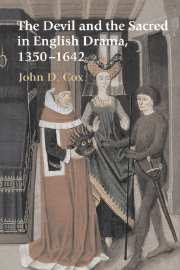Book contents
- Frontmatter
- Contents
- List of illustrations
- Acknowledgments
- Introduction
- 1 Stage devils and oppositional thinking
- 2 The devil and the sacred in the English mystery plays
- 3 Stage devils and sacramental community in non-cycle plays
- 4 Stage devils and early social satire
- 5 Protestant devils and the new community
- 6 The devils of Dr. Faustus
- 7 Reacting to Marlowe
- 8 The devil and the sacred on the Shakespearean stage: theatre and belief
- 9 Traditional morality and magical thinking
- 10 New directions
- Appendix. Devil plays in English, 1350–1642
- Notes
- Index
9 - Traditional morality and magical thinking
Published online by Cambridge University Press: 22 September 2009
- Frontmatter
- Contents
- List of illustrations
- Acknowledgments
- Introduction
- 1 Stage devils and oppositional thinking
- 2 The devil and the sacred in the English mystery plays
- 3 Stage devils and sacramental community in non-cycle plays
- 4 Stage devils and early social satire
- 5 Protestant devils and the new community
- 6 The devils of Dr. Faustus
- 7 Reacting to Marlowe
- 8 The devil and the sacred on the Shakespearean stage: theatre and belief
- 9 Traditional morality and magical thinking
- 10 New directions
- Appendix. Devil plays in English, 1350–1642
- Notes
- Index
Summary
Seventeenth-century belief about demonic illusion provides a context that helps to explain devils on the Shakespearean stage, as we have just seen, but more than demonological theories are involved in dramaturgical continuity. The moral and eschatalogical story that informed English drama from the beginning remained remarkably vital, in spite of the Reformation and increasing secularization. Remnants of the oppositional moral assumptions that shaped stage devils in the first place thus continue to appear in seventeenth-century plays, just as those assumptions remained active in English culture as a whole. Despite the increasing commercialization of London life – particularly in the theatre – playwrights and audiences continued to think in traditional moral terms, as we noticed in Jonson's targeting of covetousness in Volpone, and those terms often complement devils on the Shakespearean stage.
For most of its citizens, London social and commercial life still revolved around parishes and craft guilds, as it had before the Reformation. The joint stock company that owned the Globe Theatre was a commercial innovation, but its members lived in particular London parishes which governed much of their social interaction, from birth to death, and which compelled conformity to the English church's two remaining sacraments, baptism and communion.
- Type
- Chapter
- Information
- The Devil and the Sacred in English Drama, 1350–1642 , pp. 166 - 187Publisher: Cambridge University PressPrint publication year: 2000



